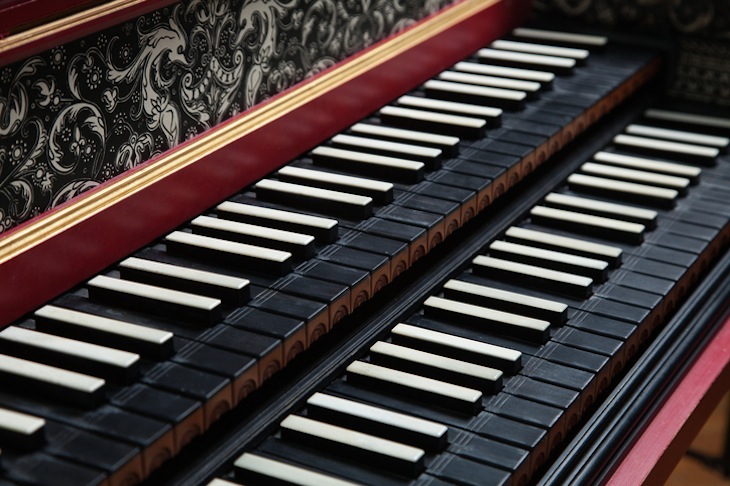The London Philharmonic Orchestra’s ‘Belief and Beyond Belief’ season is drawing to a close, without making it in any degree clearer what it was supposed to be about. Many major works have been played, and the season will end with Eschenbach conducting Beethoven’s Ninth. But then any series of concerts with a pretentious name ends in that way; in fact, I have devised several imaginary series of that kind myself, and will gladly forward the details to any orchestra looking for a grandiose rubric. I would be grateful if whoever devised the name of this current season would tell me what ‘Beyond Belief’ means. There is no need to find excuses for programming a series of more or less monumental works and, as Andris Nelsons showed earlier in the season, if you’re able to elicit a great performance of a Bruckner symphony from an orchestra that is a justification.
The pre-penultimate concert had an old-fashioned feel about it: an overture, a vocal excerpt, and after the interval a symphony. Admittedly, the overture and the vocal number were both by Wagner, and the symphony was Bruckner’s great elegy for his revered Master, but none of the pieces threw light on the others.
The overture was to Der fliegende Holländer, regrettably with the revised ‘redemption’ ending. This wonderful piece, which announces definitively Wagner’s arrival among the greatest composers, was given a bracing but routine performance. Marek Janowski, who may have made more recordings of Wagner than any other conductor, including two complete Ring cycles, and is the current conductor of the Ring at Bayreuth, ignored Richard Strauss’s famous advice to conductors not to look at the trombones (‘It only encourages them’), and from the start the performance was brass-heavy and string-light. Since the LPO’s string section is excellent but inclines to a lean tone, it was only to be heard distinctly when other instruments weren’t playing.
The second item was ‘Wotan’s Farewell and Magic Fire Music’, a nomenclature which suggests that they are two pieces, and is reminiscent of the 78rpm days when records were labelled helpfully ‘Brünnhilde implores the protection of fire’. Since this was a rather short concert — and for other reasons — it would have been much enhanced by having a Brünnhilde to do just that.
The three-quarter-hour scene between Brünnhilde and Wotan, an impressive tussle of wills and minds, leads up to Wotan’s Farewell in a way that makes it far more moving than when it is launched in vacuo. Still, the Latvian bass-baritone Egils Silins is a great artist, with a fabulous voice, indeed the finest Wotan around at present, and his intensity of expression, made possible by the perfect enunciation of the words, and occasional striking gestures, ensured that vocally this excerpt was as moving as it could be under the circumstances. Silins can be heard singing the whole role on the 2012 Hallé recording of Die Walküre under Mark Elder, a vastly superior conductor. Of the two long orchestral stretches in the Farewell, the first was hurried and merely noisy, the second, after Wotan has kissed Brünnhilde to sleep, at last gave the string section their chance, and their tone was exquisite and full. The Magic Fire Music highlighted in turn the woodwind, especially the first flute, magnificent throughout the evening.
After the interval came Bruckner’s Seventh Symphony in one of the less impressive accounts I have heard of it. While Wagner can just about take Janowski’s con brio approach to everything, Bruckner really can’t, as this performance demonstrated. It may be the only performance of the work that I have heard where I found the last two movements more effective than the first two. Janowski brought out the colours as well as the sweep of the Scherzo, and the allure of the Trio. And though I doubt that anyone can make the fourth movement into a convincing whole, Janowski’s rapid but detailed treatment succeeded in not giving the impression that it was something that, as with several other of his symphonic finales, Bruckner felt he had to write but never quite found out how.
The closing pages, in which the fairly jaunty main theme of the movement at last metamorphoses into the marvellous opening melody of the whole work, received the most powerful reading of any in the symphony. The first movement itself was unimpressive, prosaic, and with no solemn hush at its centre. The slow movement, Bruckner’s celebration of and elegy for Wagner, was fine in its lyrical second subject, thanks once more to the first flute, but not cumulative as Bruckner must above all be. At least we had the climactic cymbal clash, still a bone of contention among Bruckner scholars, but surely demanded as the music peaks in ecstasy.
All told, Bruckner needs to be more special than this.






Comments